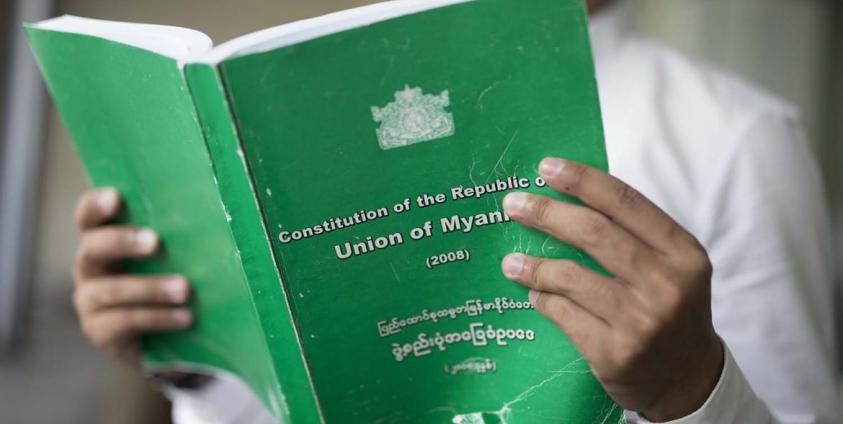This month has seen membership of a joint committee tasked with amending Burma’s military-drafted 2008 Constitution shrink. The shift has raised questions of whether the group can introduce changes to the charter that would satisfy growing calls for federalism in a charter that has long been criticized as embodying no federal principles.
Three members of the committee resigned in early September: Sein Win of the National Unity Democratic Party, and two members of the Arakan National Party (ANP)—Lower House parliamentarian Aung Kyaw Zan and Upper House MP Myint Naing.
On the day the latter two left, the ANP released a statement declaring that they could not participate in the role of building a genuine federal Union with the committee while the other members prioritized the interests of Burma’s current ruling party: the National League for Democracy (NLD).
“I want to say that, frankly, we just showed where we stand… We don’t believe in this joint committee,” another ANP parliamentarian, Oo Hla Saw of Mrauk-U in Rakhine State told SHAN.
The NLD won the majority of legislative seats in Burma’s 2015 election and promised to change the controversial 2008 Constitution, which delegates 25 percent of parliamentary seats to the military and maintains military control of key ministries.
Critics of the joint committee—which has 45 members, most of whom are in the NLD—say that the initiative was introduced because the country’s next election is approaching in 2020 and the NLD’s pledge to amend the Constitution remains unfulfilled.
“The NLD’s MPs’ domination of the 45-member committee will continue move this process [forward],” secretary of the Shan Nationalities League for Democracy (SNLD) Sai Lek said. “If the NLD agrees to change a point, they will change it. If NLD doesn’t want to change it, the point will be left the same as it was in the old Constitution,” he explained.
A total of 3,765 amendments have been proposed to the 2008 Constitution including rewordings, removals, and rewritings.
With a proposed 858 points, the ANP provided the second highest number of suggested amendments in the committee.
“It’s impossible to change these points with the [existing] regulations. Therefore, we can not participate in this process,” Oo Hla Saw said, adding that, “It’s impossible to change the Constitution inside this Parliament.”
The SNLD’s Sai Lek described a current context under which the desires of ethnic parties and communities feel increasingly sidelined as NLD political needs take center stage.
“Under these circumstances, it’s impossible to expect the federal Union that we want to build,” Sai Lek said. “If the constitutional amendment process moves on like this, it will be a superficial amending of the constitution. It will be based on the NLD’s policies,” Sai Lek added.
Despite the recent round of resignations, the NLD appears to be pushing ahead with the plan to propose changes through the joint committee.
NLD Central Executive Committee member Aung Kyi Nyunt told SHAN that his party will keep moving forward.
“Other ethnic political parties remain in the joint committee. We will try our best to change the Constitution,” he told SHAN.
Another criticism of the committee has been the presence of eight military MPs and a lack of clarity around their role.
“Currently the army-appointed MPs are closely watching the Constitution amending process. They do not discuss it in meetings,” the ANP’s Oo Hla Saw told SHAN.
It remains unknown when the amendment process will be completed, and how the many changes will be dealt with.
Military representatives have opposed changing the 2008 Constitution, which entrenches their role in politics. The charter requires at least 75 percent parliamentary approval to make amendments, effectively giving the military the opportunity to reject changes.
The Upper and Lower houses of the Union Parliament approved the formation of a joint committee to oversee potential amendments on August 9.







